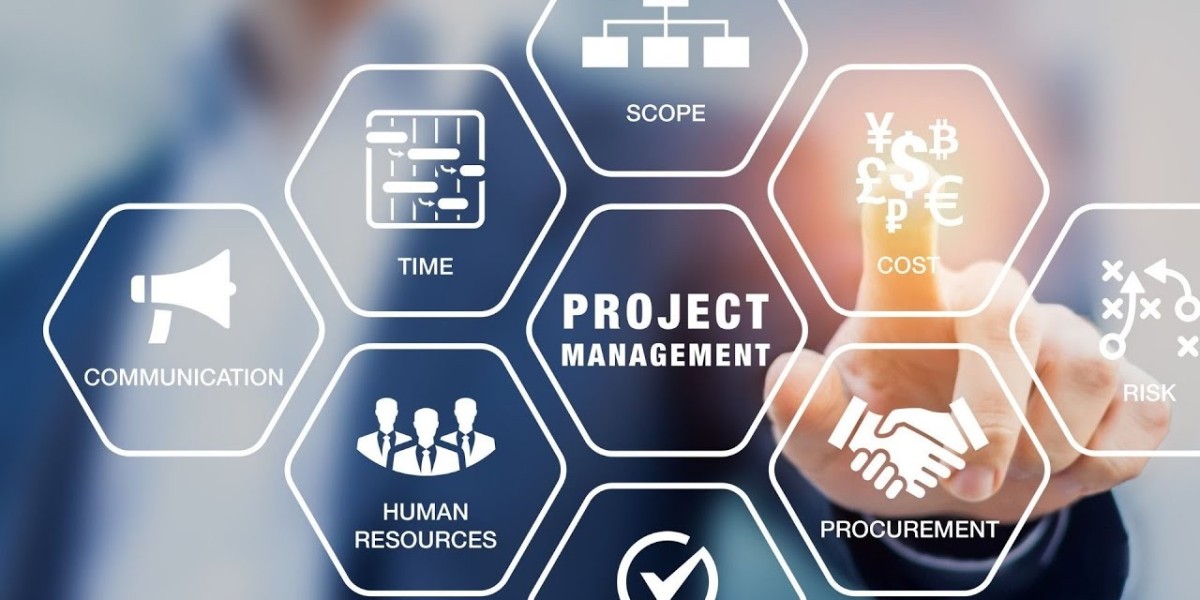Project management is a crucial discipline that involves the planning, execution, monitoring, and closure of projects. It serves as a backbone for organizations striving to achieve their goals efficiently and effectively. Whether you're managing a small team project or a large-scale enterprise initiative, understanding the fundamentals of project management can significantly impact the outcome of your efforts.
Understanding Project Management
What is Project Management?
At its core, project management is the application of knowledge, skills, tools, and techniques to project activities to meet project requirements. It encompasses various processes and phases, each designed to ensure that projects are completed successfully within the defined constraints of time, budget, and scope.
The Importance of Project Management
Organizational Efficiency: Effective project management leads to increased efficiency by streamlining processes, reducing waste, and ensuring that resources are allocated appropriately.
Risk Management: Identifying potential risks and developing mitigation strategies helps organizations avoid pitfalls and stay on track.
Quality Control: Project management emphasizes quality throughout the project lifecycle, ensuring that deliverables meet predefined standards.
Stakeholder Satisfaction: Engaging stakeholders and managing their expectations can lead to higher satisfaction rates and foster long-term relationships.
Competitive Advantage: Organizations that excel in project management can respond more swiftly to market changes, giving them a competitive edge.
Key Components of Project Management
1. Project Initiation
This phase involves defining the project at a broad level. It includes:
Project Charter: A document that outlines the project's purpose, objectives, and stakeholders.
Feasibility Study: Assessing whether the project is viable and aligns with organizational goals.
2. Project Planning
Planning is crucial for setting the direction of the project. Key elements include:
Scope Management: Defining what is included and excluded from the project.
Schedule Management: Developing a timeline that outlines project milestones and deadlines.
Resource Management: Identifying and allocating necessary resources, including human resources, materials, and budget.
Risk Management: Identifying potential risks and developing strategies to mitigate them.
3. Project Execution
In this phase, plans are put into action. Key activities include:
Team Development: Building a cohesive team and ensuring that everyone understands their roles and responsibilities.
Communication: Keeping stakeholders informed and engaged throughout the project.
Quality Assurance: Monitoring project activities to ensure that deliverables meet quality standards.
4. Project Monitoring and Controlling
Monitoring and controlling involve tracking the project's progress and making adjustments as necessary. This includes:
Performance Metrics: Measuring project performance against established baselines.
Change Management: Handling changes in project scope, schedule, or resources effectively.
Reporting: Providing regular updates to stakeholders on project status.
5. Project Closure
The final phase of project management involves formally closing the project. Key activities include:
Final Deliverables: Ensuring that all project deliverables are completed and meet quality standards.
Documentation: Compiling project documentation for future reference.
Post-Project Evaluation: Analyzing project performance to identify lessons learned and areas for improvement.
Popular Project Management Methodologies
Different methodologies can be employed to manage projects effectively. Here are some of the most popular ones:
1. Waterfall Methodology
The waterfall methodology is a linear and sequential approach where each phase must be completed before moving on to the next. It's ideal for projects with well-defined requirements and low uncertainty.
2. Agile Methodology
Agile is an iterative and incremental approach that emphasizes flexibility and customer collaboration. It allows teams to adapt to changes quickly, making it suitable for dynamic projects.
3. Scrum Framework
Scrum is a specific implementation of Agile that breaks projects into smaller, manageable units called sprints. It focuses on delivering functional increments of the product in short cycles.
4. Lean Project Management
Lean focuses on maximizing value while minimizing waste. It encourages continuous improvement and seeks to optimize processes for efficiency.
5. Six Sigma
Six Sigma is a data-driven approach that aims to improve quality by eliminating defects. It utilizes statistical methods to analyze processes and drive improvements.
Tools and Software for Project Management
In today’s digital age, a variety of tools and software solutions are available to facilitate project management. Here are some popular options:
1. Trello
Trello uses boards, lists, and cards to help teams organize tasks visually. It's particularly useful for small to medium-sized projects and promotes collaboration.
2. Asana
Asana is a versatile project management tool that offers task tracking, team collaboration, and project visualization features. It’s suitable for teams of all sizes.
3. Microsoft Project
Microsoft Project is a robust tool designed for complex project management needs. It provides Gantt charts, resource allocation, and reporting features.
4. Monday.com
Monday.com offers a customizable platform for managing projects, workflows, and tasks. Its user-friendly interface makes it easy to adapt to different team needs.
5. Basecamp
Basecamp is an all-in-one project management and team collaboration tool. It helps teams stay organized and communicate effectively.
Essential Skills for Project Managers
To be successful in project management, individuals must possess a diverse skill set, including:
1. Leadership
Effective project managers must inspire and motivate their teams while fostering a collaborative environment.
2. Communication
Clear and concise communication is vital for conveying expectations, providing updates, and managing stakeholder relationships.
3. Problem-Solving
Project managers should be adept at identifying issues and developing creative solutions to overcome obstacles.
4. Time Management
Prioritizing tasks and managing time efficiently is essential for meeting project deadlines.
5. Negotiation
Project managers often need to negotiate with stakeholders, team members, and vendors to achieve project objectives.
Challenges in Project Management
Despite its importance, project management comes with several challenges:
1. Scope Creep
Uncontrolled changes or continuous growth in project scope can derail timelines and budgets.
2. Resource Limitations
Limited resources can hinder a project’s progress and impact its quality.
3. Stakeholder Engagement
Balancing the needs and expectations of various stakeholders can be complex and requires careful management.
4. Risk Management
Identifying and mitigating risks is crucial, yet many projects fail to adequately address potential threats.
5. Communication Barriers
Poor communication can lead to misunderstandings and conflict, ultimately affecting project outcomes.
Best Practices for Effective Project Management
To navigate the complexities of project management in UK successfully, consider these best practices:
1. Define Clear Objectives
Establish specific, measurable, achievable, relevant, and time-bound (SMART) objectives to guide project efforts.
2. Foster Team Collaboration
Encourage open communication and collaboration among team members to enhance productivity and morale.
3. Use Project Management Tools
Leverage technology to streamline processes, track progress, and manage resources effectively.
4. Regularly Monitor Progress
Keep a close eye on project performance and adjust plans as necessary to stay on track.
5. Document Everything
Maintain thorough documentation to capture lessons learned, project decisions, and stakeholder feedback for future reference.
Conclusion
Project management is a dynamic and essential discipline that can significantly influence an organization's success. By understanding its components, methodologies, and best practices, professionals can enhance their ability to manage projects effectively. Emphasizing communication, collaboration, and continuous improvement will lead to better project outcomes and satisfied stakeholders. For those looking to advance their project management skills, exploring resources like Equals HR can provide valuable insights and support.










